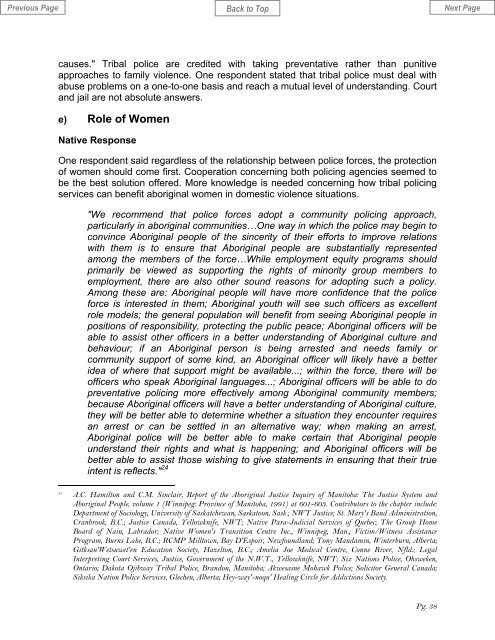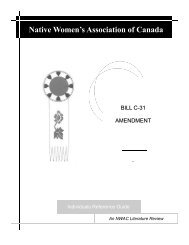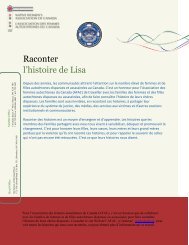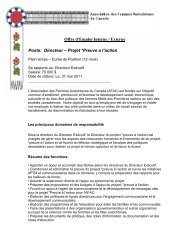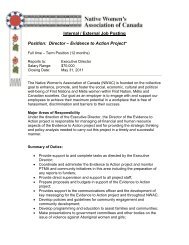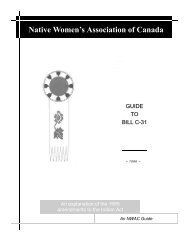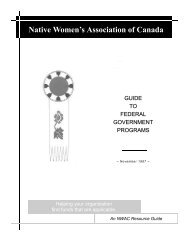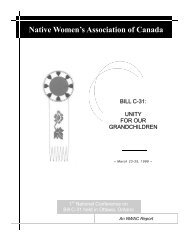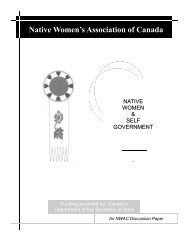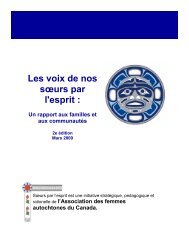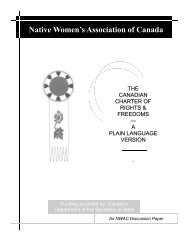POLICE CHARGING POLICIES & DOMESTIC VIOLENCE - Native ...
POLICE CHARGING POLICIES & DOMESTIC VIOLENCE - Native ...
POLICE CHARGING POLICIES & DOMESTIC VIOLENCE - Native ...
- No tags were found...
You also want an ePaper? Increase the reach of your titles
YUMPU automatically turns print PDFs into web optimized ePapers that Google loves.
causes." Tribal police are credited with taking preventative rather than punitiveapproaches to family violence. One respondent stated that tribal police must deal withabuse problems on a one-to-one basis and reach a mutual level of understanding. Courtand jail are not absolute answers.e) Role of Women<strong>Native</strong> ResponseOne respondent said regardless of the relationship between police forces, the protectionof women should come first. Cooperation concerning both policing agencies seemed tobe the best solution offered. More knowledge is needed concerning how tribal policingservices can benefit aboriginal women in domestic violence situations."We recommend that police forces adopt a community policing approach,particularly in aboriginal communities…One way in which the police may begin toconvince Aboriginal people of the sincerity of their efforts to improve relationswith them is to ensure that Aboriginal people are substantially representedamong the members of the force…While employment equity programs shouldprimarily be viewed as supporting the rights of minority group members toemployment, there are also other sound reasons for adopting such a policy.Among these are: Aboriginal people will have more confidence that the policeforce is interested in them; Aboriginal youth will see such officers as excellentrole models; the general population will benefit from seeing Aboriginal people inpositions of responsibility, protecting the public peace; Aboriginal officers will beable to assist other officers in a better understanding of Aboriginal culture andbehaviour; if an Aboriginal person is being arrested and needs family orcommunity support of some kind, an Aboriginal officer will likely have a betteridea of where that support might be available...; within the force, there will beofficers who speak Aboriginal languages...; Aboriginal officers will be able to dopreventative policing more effectively among Aboriginal community members;because Aboriginal officers will have a better understanding of Aboriginal culture,they will be better able to determine whether a situation they encounter requiresan arrest or can be settled in an alternative way; when making an arrest,Aboriginal police will be better able to make certain that Aboriginal peopleunderstand their rights and what is happening; and Aboriginal officers will bebetter able to assist those wishing to give statements in ensuring that their trueintent is reflects." 2424A.C. Hamilton and C.M. Sinclair, Report of the Aboriginal Justice Inquiry of Manitoba: The Justice System andAboriginal People, volume 1 (Winnipeg: Province of Manitoba, 1991) at 601-603. Contributors to the chapter include:Department of Sociology, University of Saskatchewan, Saskatoon, Sask.; NWT Justice; St. Mary's Band Administration,Cranbrook, B.C.; Justice Canada, Yellowknife, NWT; <strong>Native</strong> Para-Judicial Services of Quebec; The Group HomeBoard of Nain, Labrador; <strong>Native</strong> Women's Transition Centre Inc., Winnipeg, Man.; Victim/Witness AssistanceProgram, Burns Lake, B.C.; RCMP Milltown, Bay D'Espoir, Newfoundland; Tony Mandamin, Winterburn, Alberta;Gitksan'Wetsuwet'en Education Society, Hazelton, B.C.; Amelia Joe Medical Centre, Conne River, Nfld.; LegalInterpreting Court Services, Justice, Government of the N.W.T., Yellowknife, NWT; Six Nations Police, Ohsweken,Ontario; Dakota Ojibway Tribal Police, Brandon, Manitoba; Akwesasne Mohawk Police; Solicitor General Canada;Siksika Nation Police Services, Glechen, Alberta; Hey-way'-noqu' Healing Circle for Addictions Society.Pg. 38


